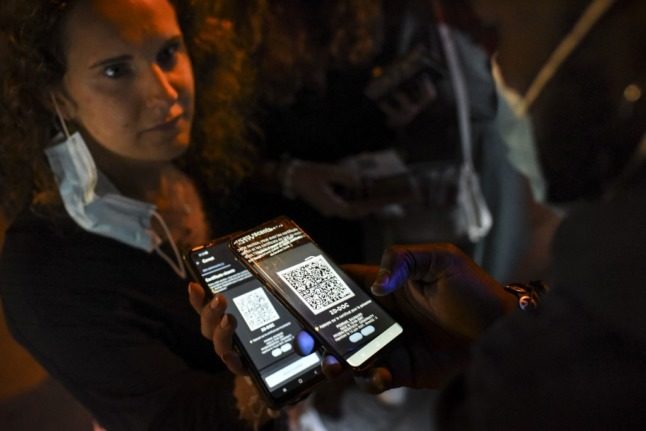The pass sanitaire, as health passports are known in France, proves that the bearer has either been fully vaccinated against Covid-19, has already recovered from the virus having tested positive more than eleven days and less than six months ago, or has received a negative test result in the past 48 hours.
Where it’s required
From July 21st, health passes have been required to enter public cultural and leisure venues such as theatres, cinemas, libraries, theme parks, concert halls, festivals, swimming pools or leisure centres, museums and monuments.
From Monday, August 9th they are also required to enter bars, cafés, restaurants (even if you are sitting outside) larger shopping centres and for long-distance train or bus travel and domestic flights. they are also required for visitors to hospitals and care homes and to access routine hospital appointments.
For a full list of venues where the pass is required, click HERE.
The rule applies to both visitors and employees of these venues, but employees have until August 30th to be fully vaccinated.
Chilren aged between 12 and 17 also have an exemption until September 30th, to allow families time to get their children vaccinated.
Face masks will no longer be required in venues where the health passport is in use, unless required by local decrees.
READ ALSO: ‘I’m a barman, not a policeman’ – French café owners call for delay in implementing health passports
Why it’s being expanded
President Emmanuel Macron defended the tightening of the restrictions after earlier pledging that the health pass would not be required for “everyday activities” by saying he was trying to strike a balance between “protection and freedom, between protecting lives and reopening the country”.
Expanding the use of the health pass was the best way to achieve that balance, he said.
43 of France’s 96 mainland départments had surpassed the alert level of 50 cases for every 100,000 inhabitants on Tuesday, as France attempts to limit the effects of a fourth Covid wave.
For vaccinations, health passes become valid seven days after the second dose. The same period is in force for those who have recovered from Covid-19 and have had a single booster dose of vaccine.
For the single-dose Johnson & Johnson vaccine, known as Janssen in France, the period is four-weeks.
From August 9th, health passes will be required to enter cafés, restaurants, bars, certain shopping centres, hospitals or nursing homes as a visitor, and long-distance travel on trains, planes or coaches.
Those aged between 12 and 17 have until September 30th to be vaccinated before health pass rules apply to them.



 Please whitelist us to continue reading.
Please whitelist us to continue reading.
Any mention of polling stations ?
How can an American with a CDC card proving vaccination get a Health Pass in France?
I just got tossed from the Jewish Museum with my Italian health pass (issued 2 July). I wasn’t the only one — my husband, another man and two children were refused entry while I was there.
I my be mistaken, but I believe the EU-compliant version (the one that also lets you travel within the EU) should suffice. Here in France, the proof-of-vaccination is now EU-compliant (and people with older, non-EU-compliant, French proof can obtain an EU-compliant version).
EU-complaint health passes only came into existence on 1st July, so I *presume* (this is a guess!) your Italian health pass of about that date isn’t EU-compliant. (Of course, it’s possible the checks were in error.) I have no idea if this presumed-glitch can be rectified whilst you are in France (nor how to rectify the problem when in Italy). Sorry!
This is horrifying!
Yes, the 112,000 people in France alone who have died would agree with you (so would the 4m world-world who have died): Covid-19 is horrifying.
The French Covid-19 patients in hospital, 99% of which are not fully-vaccinated, would also agree with you: Not being vaccinated is horrifically absurd.
So would the over 3 billion world-wide who have had a vaccine: It’s safe, so waiting despite vaccines being available, is horrific.
here’s th reason we need these. I read a quote in the news over the weekend from some guy who was at one of the anti-vaccine-certificate protests that pretty summed up the French attitude:
“Macron plays on fears, it’s revolting. I know people who will now get vaccinated just so that they can take their children to the movies, not to protect others from serious forms of covid”
This guy meant it as an indictment of Macron’s “despotic” ways, but it’s actually really a indictment of his own attitude. In other words, he was saying “I don’t care whether you live or die, I’ll only get vaccinated so that I can keep my social life”. And this is the sort of people that needs to be forced to “do the right thing”, because they won’t do it by themselves.
How do I get a Pass Sanitaire if I am a US citizen and was fully vaccinated in the US? I tried going to a pharmacy today and they did not know how to make one for me.
See “How people vaccinated in the USA can access the French health passport” (paywalled),
https://www.thelocal.fr/20210721/how-people-vaccinated-in-the-usa-can-access-the-french-health-passport/
(21-July-2021). Details can change rapidly, however.
Hi folks, I can’t find any other source for these information. Does anyone have clear information on the government’s policy on health pass for people vaccinated abroad?
Pharmacies don’t seem able to record these yet without having to “claim” that they have actually vaccinated us (which could have legal repercussions for them).
Thank you,
Jamie
What I would say to Macron….. One simple question: if the vaccinated can catch Covid & spread Covid – what EXACTLY is the point of a vaccine passport?